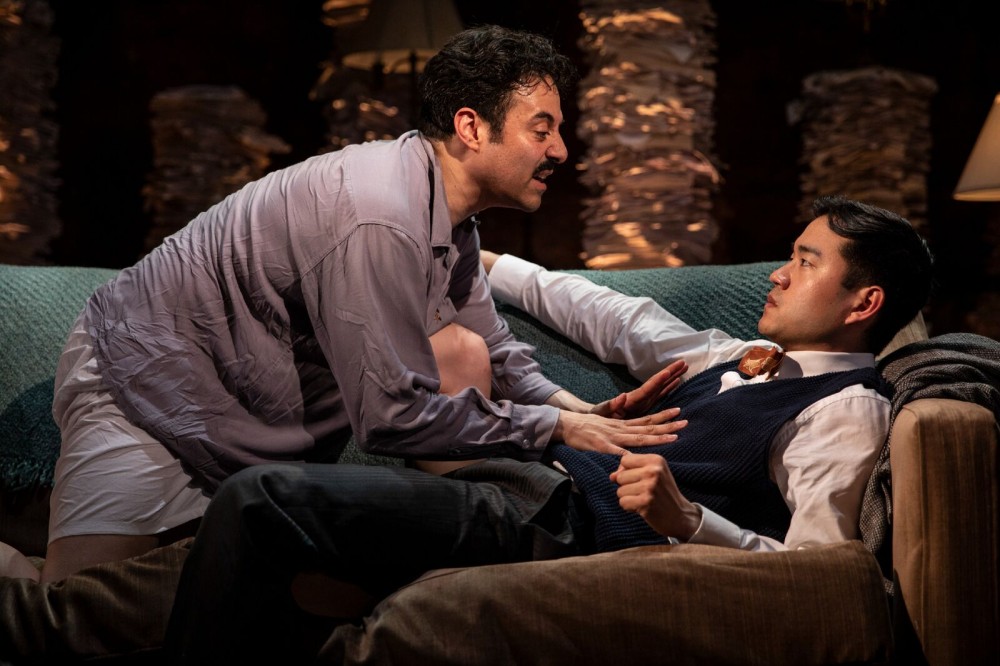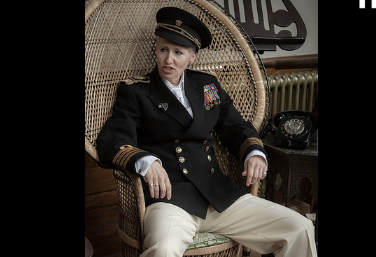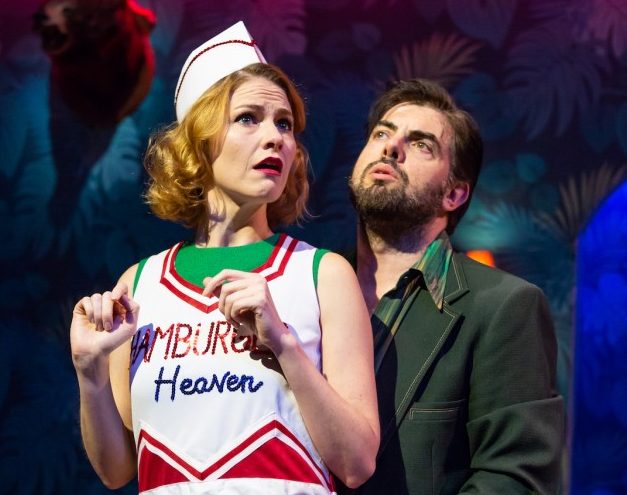by Samuel L. Leiter
During the mid-20th century, American theatre was dominated by three playwrights: Arthur Miller, Tennessee Williams, and William Inge. The latter two also happened to be good friends. Not long after Inge’s suicide, in 1973, Williams wrote an homage to Inge in the Times, recalling their first encounters.
This was during the Chicago break‐in of The Glass Menagerie and Bill came to our suburban home to interview me. He was embarrassingly “impressed” by my burgeoning career as a playwright. It’s always lonely at home now: my friends have all dispersed. I mentioned this to Bill and he cordially invited me to his apartment near the river. We had a gala night among his friends. Later we attended the St. Louis Symphony together. He made my homecoming an exceptional pleasure.
The Gentleman Caller, a verbally bloated, two-act play by Philip Dawkins at the Cherry Lane, takes abundant liberties with the circumstances of what Williams describes here (although the program cites no sources), conjecturing what happened at those meetings.
In Act I, we see the men on November 10, 1944, at Inge’s St. Louis garden apartment, when The Glass Menagerie was in rehearsal for its world premiere in Chicago and Williams was in St. Louis visiting his mother and sister. In Act II, we’re in Williams’s Chicago hotel room, on New Year’s Eve, 1944, shortly after his play opened to raves.
Sara C. Walsh’s interesting set—columnar manuscript stacks of varying heights topped by lamps—serves for both locales, looking great under Zach Blane’s atmospheric lighting.
Taking inspiration from The Glass Menagerie, whose earlier title of The Gentleman Caller Dawkins has appropriated, the play introduces Williams (Juan Francisco Villa, adequately resembling the original) as a loquacious, Tom Wingfield-like narrator who reflects on the situations from the stage’s fringes when not participating in the action.
That action begins when Williams arrives to be interviewed by Inge (Daniel K. Isaac, Billions, looking nothing like him), a journalist for the St. Louis Star-Times. Even prior to Williams’s success or failure, Inge (himself a closeted playwright) is awed to be in the presence of a local writer getting a major production.
As drinks are mixed and downed by the bibulous pair, the men discourse about their lives, their feelings, their fears of madness, their gayness (Inge is consumed with disgust), and the purpose of writing, with Williams doing his best to encourage the insecure Inge, who’s afraid of criticism. Of course, as much essential biographical detail as the dialogue can bear is squeezed in, including hints of future plays, like Come Back, Little Sheba and A Streetcar Named Desire.
Dawkins struggles to create dramatic tension, but the storm and stress, like most of the stiff dialogue, is forced and artificial. His attempt to capture the playwrights’ respective voices also lacks veracity, a result exacerbated by Tony Speciale’s not very special direction. The contrast between Villa, overacting his mustachioed, annoyingly pompous character, and Isaac’s repressed, prissy Inge (a persona at odds with the real Inge), suggests a literary version of The Odd Couple.
Knowledgeable visitors will recognize names like Audrey Wood, the agent who so ably handled their careers, or George Jean Nathan, the distinguished critic who, for some reason, is bitchily referred to as “herself” and “Miss Nathan.” Nathan, in fact, was not only known for his heterosexual dalliances but had what was considered one of the great theatre romances with Julie Haydon, Menagerie’s original Laura, whom he finally married when he was 72.
Bitchiness, in fact, is pervasive in The Gentleman Caller, which revels in the men’s attraction for one another (“You are my god!” Inge professes), and the cattiness of their sniping (“You’re too bitch for my taste,” Inge tells Williams). The play is also unconvincingly preoccupied with imagining the 33-year-old Williams and the 31-year-old Inge engaging in lots of sexual or romantic hanky-panky, including an outlandish bit of voyeurism.
Inge is known to have been deeply troubled by his sexuality but, bizarrely, within minutes of meeting Williams he practically rapes him, only to then feel shame and declare he’s not homosexual. On the other hand, he doesn’t protest when Williams later plays footsie by using his toes so deftly the play could be retitled The Genital Caller. During Act II, Williams walks around shirtless, in boxers, and using a crutch. Is this a proto-Brick Pollitt we see before us?
Except for one moment when Inge offers his opinion on which Glass Menagerie character most closely resembles Williams, The Gentleman Caller fails to illuminate either man or his work. This play is not a glass unicorn waiting to be broken; it already has no horn.
Photos: Maria Baranova
The Gentleman Caller Abingdon Theatre Co.
Cherry Lane Theatre
38 Commerce St., NYC
Through May 26

























